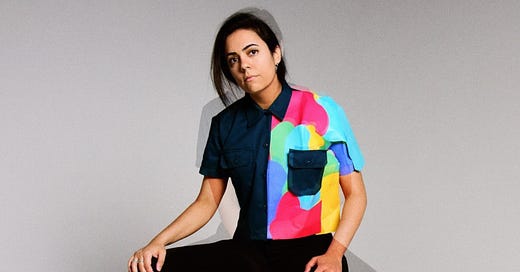Welcome to Human Pursuits, the column that features need-to-know names and stories in media and other creative spaces. Today, an outtake from my conversation with (Illuminati Hotties) – and an afterthought on overnight success.
Read part one of our conversation HERE.
Outtake
ES: Circling back on the idea that you wanted to be a producer before you wanted to be a touring musician – would you ever scale back your live performances and produce full-time? Or are you happy with the balance?
ST: I love the balance right now, and I love to play. There will probably be a point in my life when touring becomes more complicated. It could be budget, age, whatever. Something will make it less realistic to tour. But I hope, if that happens, that it coincides with production keeping me very busy.
There’s the feeling that youth is rewarded in the music industry. Young artists and young bands. I don’t agree with it, but that isn’t necessarily the case for producers. Your career blooms later in your life, once you’ve made a certain number of records. You need to have done your paces. There are not a lot of people who are 22 and have made the greatest records of their career.
I hope that as touring winds down, if it winds down, that production will pick up and keep me busy. It would be easy enough for me to say, “I’m going to stay in the studio this year.” I'd be totally happy doing that. But I do love to play, and I love to be out on the road, and being in front of people.
Afterthought
One thing I’ve learned running Human Pursuits is that everything takes longer than I expect. This applies to the writing, editing, and interviewing, sure. But also everything behind the scenes, from selecting images, to emailing publicists, to simply consuming the work of whoever I’m chatting with.
Anyway you slice it, there’s a slight feeling of overwhelm, of having bitten off more than I can chew.
In 2021, when the newsletter was getting off the ground, I found this stressful to no end. I wanted things to move in a timely fashion. I thought that, if I rushed, I could reach my goals faster. It’s only in the past year or so that I’ve come to appreciate the reality of my situation. That by rushing, I was robbing myself of the very experience I desperately wanted.
It takes 10 years to become an overnight success. But that equation relies on more than the simple passing of time. You can’t carve the days into the wall and think you’re getting somewhere. You need to try things.
As Sarah so brilliantly points out, there aren’t many young producers making interesting music. The ones that are likely started when they were young. Jack Antonoff, for example, was 33 when he produced Lorde’s Melodrama. It was his first time taking the lead, but he had already been a professional musician for fifteen years, performing and touring in Steel Train, fun., and Bleachers, and co-writing with Taylor Swift, Tegan and Sara, and Sia, among others.
There is no substitute for time spent. Which is why I find growth-hacker/optimization culture so exasperating. Everybody wants the shortcut to success. But they never consider whether they’d even be equipped to handle it. It’s one thing to want attention, but what happens when you finally get it?
The answer isn’t always clear. But the question seems less daunting when you’ve spent years preparing for it.
Sarah Tudzin is a musician and record producer. She lives in Los Angeles.





